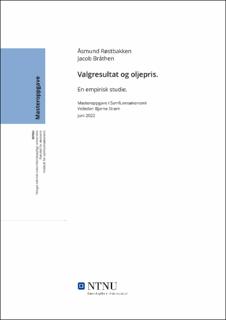| dc.contributor.advisor | Strøm, Bjarne | |
| dc.contributor.author | Røstbakken, Åsmund | |
| dc.contributor.author | Bråthen, Jacob | |
| dc.date.accessioned | 2022-07-08T17:20:59Z | |
| dc.date.available | 2022-07-08T17:20:59Z | |
| dc.date.issued | 2022 | |
| dc.identifier | no.ntnu:inspera:114728922:64151662 | |
| dc.identifier.uri | https://hdl.handle.net/11250/3004194 | |
| dc.description.abstract | I denne masteroppgaven har vi undersøkt om oljeprisvariasjon har en påvirkning på valgutfall under stortingsvalg i Norge på kommunalt nivå. Vår undersøkelse ser nærmere på om variasjon i oljepris vil ha ulik påvirkning på politisk oppslutning basert på nærheten til oljesektoren. Bakgrunnen for valg av oppgave er vårt ønske om å bidra med mer kunnskap på området, da vi opplever mangel på forskning rundt denne tematikken. Vi har hentet inn data fra samtlige kommuner i Norge før kommunesammenslåingen for valgårene 2009, 2013 og 2017. Vi har benyttet oss av statistikkprogrammet STATA for å besvare problemstillingen for oppgaven, med utgangspunkt i et paneldatasett for kommunene. Vi bruker to ulike estimeringsmetoder, der den første er pooled OLS metoden. Siden pooled OLS vil gi utfordringer ved paneldata benytter vi oss også av fixed effects metoden.
Oppgavens resultater viser til at en økning i oljepris vil ha negativ effekt på oppsluttningen om høyresiden i oljeeksponerte kommune, både ved estimering med pooled OLS og fixed effects metoden. Dette samsvarer med tidligere forskning gjennomført ved økonomiske konjunkturendringer sin påvirkning på valgutfall. Med utgangspunkt i oppgavens datagrunnlag fant vi også ut at oljeeksponerte kommuner stemmer i større grad mot høyresiden sammenlignet med kommuner uten oljeeksponering. | |
| dc.description.abstract | In this master's thesis, we have investigated whether oil price variation has an impact on election results during parliamentary elections in Norway at the municipal level. We take a closer look at whether variation in oil prices will have a different impact on political support based on proximity to the oil sector. The background for the choice of thesis is the lack of research conducted in this area. We have collected data from all municipalities in Norway before the municipal merger for the election year periods 2009, 2013 and 2017. We have used the statistics program STATA to answer the problem. The thesis is based on a panel dataset for Norwegian municipalities. We use two different estimation methods. The first is pooled OLS. Since pooled OLS will present challenges on panel data, we also use the fixed effects method.
Our results from both pooled OLS and fixed effects estimation show that an increase in oil prices will have a negative effect on support for the right sided political parties in oil-exposed municipalities. This is in line with previous research done on how economic changes impact election outcomes. We also found that oil-exposed municipalities vote more towards the right hand side of the political axes than municipalities without oil exposure. | |
| dc.language | nob | |
| dc.publisher | NTNU | |
| dc.title | Valgresultat og oljepris. En empirisk studie. | |
| dc.type | Master thesis | |
